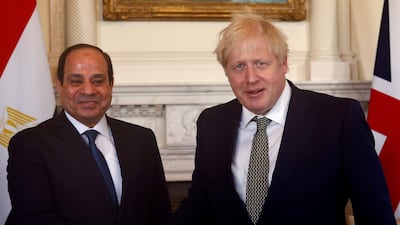Egypt and Britain have agreed on a wide-ranging economic partnership as London looks to life after Brexit and Cairo focuses on joint sustainable development.
The agreement includes science, research and innovation partnerships, British training for Egyptian medical professionals and £50 million from the UK “to support Egypt’s continued stability and prosperity”.
London hopes to build on Egypt’s location as a centre for trade and connectivity in Africa.
It says it will provide assistance for reforms to “unlock” Egypt’s private sectors and bolster its economic growth.
The announcement came during the UK-Africa Investment Summit, with British Prime Minister Boris Johnson and Egyptian President Abdel Fattah El Sisi also holding talks.
The two "agreed on the need to increase trade between the UK and Egypt", a spokesman for Mr Johnson said.
They also welcomed the resumption of flights to the Red Sea resort town of Sharm El Sheikh.
“The Prime Minister and President spoke about UK and Egyptian collaboration in education and undertook to build on this in the coming years," the spokesman said.
Britain has already invested $48bn into Egypt, the agreement said.
“The UK is committed to deepening its bilateral co-operation with Egypt and growing our strong trading relationship,” said Britain’s International Development Minister, Alok Sharma.
“Our joint statement paves the way for us to intensify our economic partnership and support Egypt to develop a sustainable economy that can benefit future generations."
Egypt’s International Co-operation Minister, Rania Al Mashat, said the UK was a “strategic partner”.
Cairo has embarked on a development strategy called Vision 2030 as it focuses on re-energising its economy.
Britain said it would continue to give its “support for inclusive economic growth, youth and social development”.
It said it would give millions of pounds to support Egypt’s most marginalised people and tackle unemployment.
“What Egypt is doing for the UK is most likely strategic in nature and continued access,” said Theodore Karasik, senior adviser to Gulf State Analytics. "Cairo needs investment from many sources."
Mr Karasik said relations with Egypt were “part and parcel” of how the UK now saw itself. He said “rebuilding Egypt is like a gateway to the new Africa”.
“Post-Brexit Britain is deeply vested in the Suez and surrounding waterways, from a historical point of view and now within the current context of the geo-economic race to Africa,” he said.
Britain is preparing to leave the EU at the end of the month. Mr Johnson has said the UK’s departure meant it would open a new age of global trade freedom.
At the UK-Africa investment summit, African leaders said Brexit offered an exceptional opportunity to forge new trade links
“Because of Brexit, the UK has to restructure its relationships with countries of the Middle East and they’ve been doing that now for a couple of months, maybe longer,” Mr Karasik said.
He said Egypt and Oman were two “cornerstones” of British foreign policy because they were close to narrow major shipping straits.
Having a regional “anchor” in Egypt “goes really to the heart” of the East of Suez concept, Mr Karasik said, referring to British military policy outside of Europe.
Global tension, including in the Middle East but also further afield, has led some in Britain to call for increased military presence outside of the Atlantic.
Egypt is fighting a terrorist insurgency on the Sinai Peninsula, although the agreement made no reference to military matters.
Mr Johnson and Mr El Sisi this week attended a conference in Berlin dedicated to the Libyan crisis.
"The prime minister stressed the need for a ceasefire and for UN-led talks to find a political solution to the conflict," a spokesman for Mr Johnson said.


